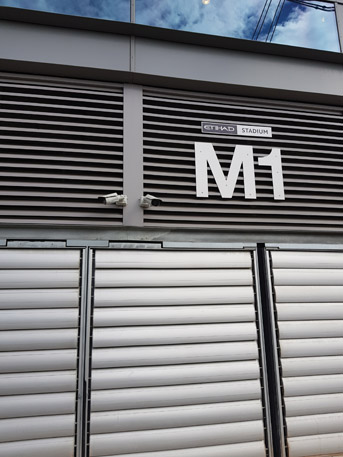That a football match had to be postponed on Sunday because of a pitch incursion by the club’s own fans was not only proof of how plain odd life has become. It showed how odd football is, writes Mark Rowe.
First one man had a go, aiming his right foot at the glass door, having punched the air to acknowledge the cheers from fellow fans. Then another man with a can of beer in his left hand had a go, and the door caved in. To more cheers, the fans – nearly all young men – poured through the door of the entrance AE8 at Old Trafford, the home of Manchester United FC. It was one of a chain of events that led to the calling off of a Premier League match against Liverpool on Sunday, May 2. Quite apart from the reputational harm – this was the first Premiership match called off due to fans’ trespass – it added to fixture congestion at an always crowded end of season, especially thanks to the covid pandemic. All because a thousand or more fans breached perimeter security, during a loud but largely peaceful protest against the American owners of United, the Glazer family.
Hotel too
Let’s leave aside the motives of the protesters, or rather; note that as with many large protests, various people had different motives and behaved differently. Some carried the travelling fans’ tell-tale piece of kit; a Tesco plastic bag holding cans of beer or bottles of spirits. As before the pandemic caused matches to be played behind closed doors from March 2020, some fans use football as an excuse for a drunken day out, to bait or abuse police, stewards, and train, pub or motorway service station staff. No two clubs are alike. Though the occasion for the May 2 and other demos was the abortive European ‘Super League’, that fans of Arsenal, Tottenham, Chelsea and Manchester City also decried, United fans’ protests have been most bitter. ‘Glazers going to die,’ chanted scores of fans outside the Lowry Hotel, where United players were waiting to enter a bus to carry them to Old Trafford. The gathering of players at a hotel is normal, for safety reasons – it means one entry and exit to protect, not innumerable ones. It can become absurd as in 2016 when the Sloevnia national team wanted to walk to Wembley Stadium from their hotel, the Hilton a stone’s throw away; they had to take the bus, which took far longer than walking.
Bus target
A team bus has long been a target for angry fans; in 2016, the Manchester United bus had bottles thrown at it as it went to Upton Park for West Ham’s last match there, before their move to the Olympic Stadium. Likewise the Real Madrid bus was stoned on arriving at Liverpool FC in April 2020. While the ‘Super League’ was briefly alive, Leeds fans tried to deny the Liverpool team bus access to Leeds’ Elland Road ground to play a fixture, just as Chelsea fans did outside their ground. Just as the May 2 demo showed that any perimeter is only as strong as its weakest point, so the securing of stadia has only displaced fan protest outside the ground. Social media has opened a new front for fans to express anger; May 2 happened to fall on the weekend that football and other sports abstained from social media in their own protest against online hate.
New era
Perimeters at sports grounds date from at least the 1840s, when travelling professional cricket teams played behind fences, to force people to pay to watch. Gates and fire doors and walls were all vulnerable to the fan trying their luck to get in without paying; and indeed the burglar. As at the Colisseum in classical Rome, a stadium is Janus-faced; it serves to keep paying fans in, and deny access to anyone else.
Never satisfied
Despite the gradual physical fortifying of stadia – new era grounds such as Wembley and Manchester City’s Ethihad (pictured) are that much more difficult to enter without a ticket, as anyone can see who walks around their footprint – the psychology of some fans remains mixed: carnivalesque, or hooligan. ‘We’re Manchester United, we do what we want,’ was one chant on May 2. That all football protests broke coronavirus rules about not gathering in public was ignored, just as some fans have chosen to do as they pleased to celebrate regardless of the pandemic – when Liverpool won the Premier League last summer, and Coventry City won promotion to the Championship; and when Rangers won the Scottish Premier League title in March. Likewise some inhabitants of Marine chose to take to the streets to watch Tottenham FC visit, in the FA Cup in January.
Other clubs’ fans have long been angry at their owners: Newcastle, and Coventry, to name two. Besides, the very nature of sport makes for a security risk of unhappy fans; pre-pandemic, no season would end without some relegated or badly-performing club having fans chant ‘sack the board’ or the like. Or, fans might take offence at what they see as under-performance. Manchester United after all are second in the Premier League, which would delight most clubs’ fans; except that rivals Manchester City are first.










